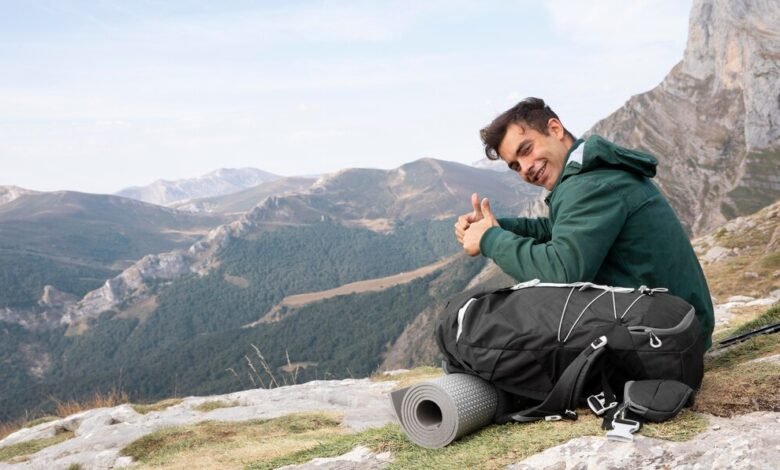How to Prepare Mentally for the Everest Base Camp Trek

Preparing mentally for the Everest Base Camp trek is as crucial as physical conditioning, given the psychological demands of trekking at high altitudes and the isolation of the Himalayas. Mental readiness can significantly impact your overall trekking experience, helping you manage challenges, maintain motivation, and embrace the journey with resilience.
First and foremost, understanding the trek’s demands and setting realistic expectations is vital. The Everest Base Camp trek is a challenging adventure that requires more than just physical stamina; it demands mental fortitude. Being aware of the physical and emotional hurdles, such as long days of trekking, fluctuating weather conditions, and potential altitude sickness, helps build a mental framework to handle these obstacles. Visualizing the trek, including the daily routine, the scenic beauty, and the difficulties, prepares you mentally for what lies ahead. This visualization can help acclimate your mind to the reality of the trek, making the actual experience less daunting.
Equally important is developing a positive mindset and cultivating resilience. The EBC trek will test your perseverance, especially during moments of fatigue or when facing adverse weather conditions. Embracing a positive outlook and focusing on the rewarding aspects of the journey—such as reaching Base Camp and witnessing breathtaking landscapes—can enhance your motivation. Setting small, manageable goals and celebrating each milestone can also help maintain a positive attitude. This approach turns the trek into a series of achievable steps, making the challenge seem less overwhelming.
Preparing for potential psychological stress is another key aspect. The isolation and high-altitude environment can be mentally taxing, leading to feelings of loneliness or anxiety. Familiarizing yourself with stress-relief techniques, such as deep-breathing exercises, mindfulness, or meditation, can help manage these feelings. Carrying personal items that bring comfort, such as a journal or photos of loved ones, can also provide emotional support during challenging moments.
Building mental endurance involves gradually exposing yourself to situations that simulate the trek’s demands. This could include long hikes, multi-day treks, or even intensive workout sessions to replicate the physical strain. These experiences help acclimate both your body and mind to the conditions you will face, making the actual trek feel more manageable. Additionally, learning about the cultural and environmental aspects of the region can foster a deeper connection and appreciation, enriching the trekking experience and bolstering your mental resolve.
Lastly, seeking advice from previous trekkers and engaging with trekking communities can provide valuable insights and mental preparation. Hearing firsthand accounts of their experiences can offer practical tips, reassurance, and motivation. Preparing mentally for the Everest Base Camp trek involves a comprehensive approach, blending understanding, positive thinking, emotional preparedness, and practical experience. By addressing these aspects, you can approach the trek with confidence and resilience, making the journey to Everest Base Camp not only a physical challenge but also a profoundly rewarding mental achievement.
The Importance of Mental Preparation
Mental preparation is crucial for the Everest Base Camp trek Accommodation, given the trek’s demanding nature and the significant mental challenges it presents. Unlike purely physical training, mental preparation involves building psychological resilience and readiness to tackle the trek’s inherent difficulties. The high-altitude environment, potential isolation, and long trekking days can be mentally taxing, making it essential to prepare yourself mentally. By developing a strong mental framework, you can enhance your ability to cope with stress, remain motivated, and navigate the trek with greater ease. Mental preparation helps in anticipating the trek’s demands and equipping yourself with coping strategies, such as stress management techniques and positive thinking. It also prepares you for the potential emotional ups and downs, such as homesickness or feelings of fatigue. A well-prepared mind can transform challenges into manageable tasks and maintain a focus on the trek’s rewarding aspects. Overall, mental preparation contributes to a more fulfilling and successful trekking experience, making it as essential as physical conditioning.
Understanding the Challenges Ahead
Understanding the challenges ahead is fundamental for effective mental preparation for the Everest Base Camp trek. The trek is known for its physical and psychological demands, including the risks associated with high-altitude environments. Trekkers face variable weather conditions, long and strenuous hiking days, and the potential for altitude sickness. The trek’s remote location means limited access to medical facilities and support, adding an extra layer of difficulty. Being aware of these challenges enables you to mentally prepare for the trek’s realities, rather than facing unexpected difficulties. Knowledge of the trek’s demands allows you to develop appropriate coping strategies and mental resilience. It also helps in setting realistic expectations and being mentally prepared for tough days. Understanding these challenges is key to maintaining motivation and managing stress throughout the trek, ultimately leading to a more successful and rewarding experience.
Setting Realistic Goals and Expectations
Setting realistic goals and expectations is vital for mental preparation on the Everest Base Camp trek. Given the trek’s challenging nature, it’s essential to have a clear understanding of what you can realistically achieve each day. Setting small, attainable goals—such as reaching specific landmarks or completing certain sections of the trail—can help maintain motivation and prevent feelings of overwhelm. Unrealistic expectations, such as completing the trek in an unusually short time or underestimating the physical and mental strain, can lead to frustration and disappointment. By setting realistic goals, you align your expectations with the actual demands of the trek, which helps in managing stress and enhancing overall satisfaction. This approach involves planning your daily distances, allowing adequate rest days, and preparing for unforeseen circumstances. Realistic goal-setting not only helps in managing the trek’s physical challenges but also supports a positive mental outlook, contributing to a more enjoyable and successful trekking experience.
Visualizing the Trek: Mental Rehearsal Techniques
Visualizing the trek through mental rehearsal techniques is a powerful tool for mental preparation for the Everest Base Camp journey. Mental rehearsal involves vividly imagining the entire trek experience, including daily routines, challenges, and the rewards of reaching Base Camp. By creating detailed mental images of trekking through the Himalayas, navigating rugged terrain, and achieving milestones, you mentally prepare yourself for the physical and emotional aspects of the trek. This technique helps in familiarizing yourself with the trek’s demands, reducing anxiety, and increasing confidence. Visualization also allows you to rehearse coping strategies for potential challenges, such as altitude sickness or adverse weather conditions. Incorporating mental rehearsal into your preparation routine—through practices like guided imagery, mindfulness, or focused visualization exercises—can enhance your readiness and resilience. This mental preparation method supports a smoother transition from preparation to actual trekking, making the adventure feel more manageable and less daunting.
Developing a Positive Mindset
Developing a positive mindset is essential for overcoming the psychological challenges of the Short Everest Base Camp trek. A positive mindset involves maintaining an optimistic outlook, focusing on the trek’s rewards, and managing setbacks with resilience. Embracing a positive attitude helps in navigating the trek’s physical and mental hurdles, such as fatigue, altitude sickness, and adverse weather conditions. By concentrating on the journey’s rewarding aspects, such as the stunning landscapes and the sense of accomplishment, you can maintain motivation and enthusiasm. Techniques for developing a positive mindset include practicing gratitude, engaging in affirmations, and focusing on progress rather than obstacles. Additionally, preparing for the trek with a mindset of curiosity and adventure, rather than fear or apprehension, contributes to a more enjoyable experience. Cultivating a positive attitude not only enhances your mental resilience but also fosters a sense of fulfillment and satisfaction throughout the trek.
Building Mental Resilience and Endurance
Building mental resilience and endurance is essential for the demanding Everest Base Camp trek. Mental resilience refers to the ability to adapt to adversity, recover from setbacks, and maintain a positive outlook despite challenges. Endurance, on the other hand, involves sustaining effort and motivation over prolonged periods. To develop these qualities, start by embracing gradual exposure to challenges during your training. This could involve undertaking long hikes with variable terrain or participating in endurance sports that simulate the trek’s demands. Additionally, practicing mindfulness and stress-management techniques can enhance your ability to remain focused and composed. Setting incremental goals and celebrating small achievements during your training helps build confidence and psychological endurance. It’s also beneficial to reflect on past experiences where you overcame difficulties, as this reinforces your ability to handle future challenges. Developing a support network, such as connecting with fellow trekkers or joining a trekking group, can also bolster mental resilience. By proactively building mental strength and endurance, you prepare yourself to tackle the psychological and physical demands of the Everest Base Camp trek with greater confidence and ease.
Dealing with Anxiety and Fear
Dealing with anxiety and fear is a crucial aspect of mental preparation for the Everest Base Camp trek. The prospect of high altitudes, challenging terrain, and isolation can trigger significant anxiety and fear. To manage these feelings, start by acknowledging and understanding your fears rather than ignoring them. Educate yourself about the trek’s challenges and develop a plan to address potential concerns, such as acclimatization strategies for altitude sickness or safety protocols for adverse weather. Techniques like deep breathing exercises, progressive muscle relaxation, and visualization can help reduce anxiety and foster a sense of control. Additionally, talking to others who have completed the trek can provide reassurance and practical insights. Focusing on preparation and building confidence through training can also alleviate fear, as it enhances your readiness and ability to handle unexpected situations. By employing these strategies, you can manage anxiety and fear more effectively, allowing you to approach the trek with a calmer and more positive mindset.
Preparing for Isolation and Loneliness
Preparing for isolation and loneliness is an important aspect of mental readiness for the Everest Base Camp trek Weather. The trek’s remote location and extended duration mean that trekkers may experience periods of solitude and separation from familiar social networks. To mitigate feelings of loneliness, start by preparing mentally for the possibility of being away from home and loved ones. Engage in activities that connect you with the trek’s community, such as joining trekking groups or forums, to build a sense of camaraderie before the journey. During the trek, establish routines and engage with fellow trekkers and local guides to foster social interactions and create a support network. Carrying personal items, such as photos or letters from home, can provide comfort during solitary moments. Additionally, developing coping strategies, such as mindfulness or journaling, can help manage feelings of isolation. By proactively addressing these aspects, you can enhance your emotional resilience and make the trek a more enjoyable and fulfilling experience.
Managing Stress and Coping with Uncertainty
Managing stress and coping with uncertainty are essential skills for the Everest Base Camp trek. The trek’s unpredictable weather, challenging terrain, and potential for unforeseen events can create stress and uncertainty. To manage these factors, start by practicing effective stress-management techniques such as deep breathing, meditation, or progressive muscle relaxation. Maintaining flexibility in your plans and being prepared for changes or delays can also help reduce stress. Developing a proactive mindset by focusing on what you can control—such as preparation, training, and safety measures—can shift your attention away from uncertainties. Creating a contingency plan for potential challenges, like adverse weather or health issues, provides a sense of preparedness and control. Engaging in positive self-talk and reminding yourself of your preparedness and capabilities can also help manage stress. By implementing these strategies, you can navigate the trek’s uncertainties with greater confidence and maintain a balanced, positive outlook throughout the journey.
Staying Motivated During Training
Staying motivated during training for the Everest Base Camp trek is crucial for ensuring you are physically and mentally prepared for the challenge. Motivation can be sustained through a combination of goal-setting, tracking progress, and maintaining a positive mindset. Start by setting clear, achievable goals for your training, such as increasing your hiking distance or improving endurance. Break these goals into smaller milestones and celebrate each achievement to maintain enthusiasm. Incorporating variety into your training regimen, such as cross-training activities, strength exercises, and different hiking routes, can also keep the routine engaging and prevent monotony. Engaging with a training group or finding a workout buddy can provide support, accountability, and shared motivation. Additionally, visualizing the rewards of completing the trek, such as reaching Everest Base Camp and experiencing the Himalayas, can reinforce your commitment and drive. Keeping a training log or journal to document progress and reflect on improvements helps maintain focus and motivation. By employing these strategies, you can stay motivated and committed to your training, ensuring you are well-prepared for the Everest Base Camp trek.
Practicing Mindfulness and Relaxation Techniques
Practicing mindfulness and relaxation techniques is essential for maintaining mental well-being during the Everest Base Camp trek Itinerary. Mindfulness involves staying present and fully engaging with the current moment, which can help manage stress and anxiety associated with the trek. Techniques such as deep breathing, progressive muscle relaxation, and meditation can be beneficial. Deep breathing helps calm the nervous system and reduce anxiety, while progressive muscle relaxation involves tensing and then relaxing different muscle groups to alleviate physical tension. Meditation can improve focus and emotional stability, enabling you to handle the trek’s challenges with greater composure. Incorporating mindfulness into your daily routine before the trek can prepare you for high-pressure situations, enhancing your ability to stay grounded during strenuous or isolated moments. Practicing these techniques regularly can also improve your overall resilience and mental clarity, making it easier to navigate the physical and psychological demands of the trek.
Preparing for Physical and Emotional Fatigue
Preparing for both physical and emotional fatigue is crucial for a successful Everest Base Camp trek. Physically, the trek involves long hours of walking on rugged terrain at high altitudes, which can lead to exhaustion. To prepare, engage in endurance training and simulate trekking conditions as closely as possible. This includes long hikes, stair climbing, and carrying a weighted pack to build stamina and strength. Emotional fatigue, often stemming from isolation or the trek’s challenges, requires mental preparation. Developing coping strategies, such as setting achievable goals and maintaining a positive outlook, can help manage emotional strain. It’s also beneficial to plan for regular rest days to recover both physically and mentally. By anticipating fatigue and preparing for it through physical training and emotional resilience strategies, you can better handle the trek’s demands and maintain your energy and motivation throughout the journey.
Establishing a Support System
Establishing a support system is vital for mental preparation for the Everest Base Camp trek. A strong support system provides encouragement, practical advice, and emotional reassurance throughout the preparation and trekking phases. Start by connecting with fellow trekkers, either through trekking forums, social media groups, or local clubs. Engaging with those who have completed similar treks can offer valuable insights and support. Additionally, sharing your trekking plans with friends and family helps keep you motivated and provides a sense of accountability. Having a reliable trekking guide or joining a trekking group can also offer practical support and companionship during the trek. Establishing communication channels with loved ones and staying in touch during the trek can provide emotional comfort and a connection to home. By building a robust support network, you enhance your ability to manage challenges and maintain motivation throughout the trek.
Developing Problem-Solving Skills for Unexpected Situations
Developing problem-solving skills is essential for handling unexpected situations during the Everest Base Camp trek. The trek’s unpredictable nature, including sudden weather changes, altitude-related issues, or unforeseen logistical challenges, requires a proactive approach to problem-solving. Start by anticipating potential issues and creating contingency plans. This could involve learning basic first aid, understanding how to manage altitude sickness, or having alternative routes in case of trail closures. Practicing flexibility and adaptability is also crucial, as conditions may change unexpectedly. During training, simulate problem-solving scenarios, such as dealing with adverse weather or injury, to build your confidence and decision-making skills. Additionally, staying informed about the trek and seeking advice from experienced trekkers can enhance your ability to handle unforeseen situations. By developing these skills and maintaining a calm, solution-oriented mindset, you can effectively navigate challenges and ensure a safer and more successful trek.
Maintaining Mental Health During and After the Trek
Maintaining mental health during and after the Everest Base Camp trek Weather is crucial for overall well-being and a positive experience. During the trek, managing stress, anxiety, and fatigue is key to sustaining mental health. Implementing mindfulness techniques, such as deep breathing and meditation, can help keep stress levels in check. Staying connected with fellow trekkers and maintaining a positive mindset can also alleviate feelings of isolation or homesickness. After the trek, it’s important to process and reflect on the experience. This can be achieved through journaling, sharing your experiences with others, or engaging in relaxation activities to unwind. Post-trek, allow yourself adequate time to rest and recover both physically and emotionally. Seeking support from friends, family, or mental health professionals if needed can aid in addressing any lingering psychological effects of the trek. By prioritizing mental health throughout and following the trek, you ensure a more balanced and fulfilling adventure, and a smoother transition back to everyday life.



